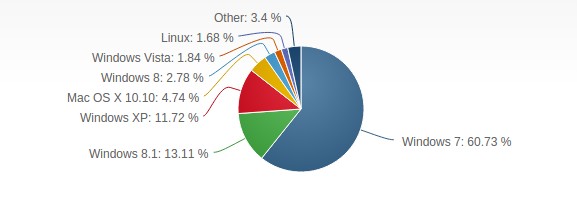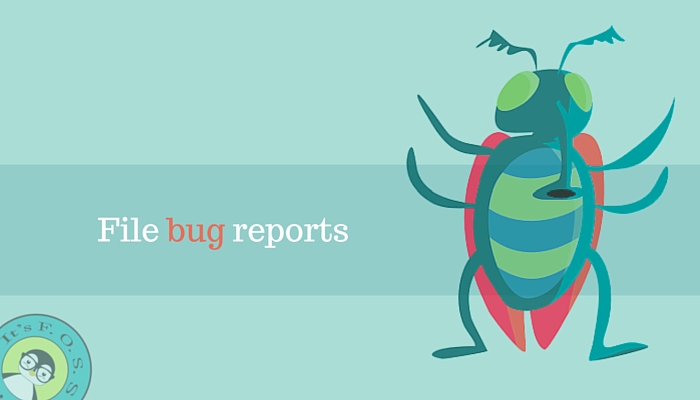How can I help Linux?
This is a question often asked by Linux lovers who want to give it back to the community of GNU/Linux. Linux and Open Source both are heavily community oriented and if you think about helping Linux, it is indeed a sign of a real Linux lover. But this question is often accompanied by:
- I want to help, but I am not a coder
- I do not have enough free time to contribute
- I don’t know which project needs my contribution
At times, I have been asked to advise on how can a ‘normal Linux user’ help the Linux community. In this article, I am listing several ways a normal Linux user, who has been using Linux for a few months/years, could contribute to grow Linux user base and help the community. But before we see that, let’s first see why should you contribute to Linux.
Why should you help Linux?
Linux is more than 25 years old now. While Linux rules on supercomputers and servers, the desktop Linux still struggles. As per 2015 Net Market Share report, Linux runs only on 1.68% of desktops. This is lesser than the market share of Microsoft’s disastrous operating system Windows Vista (which, for some reasons, still has 1.84% market share).
This is the condition when there are over 300 Linux distributions with a number of them being desktop focused. Linux was (and still) considered to be the “geek only” zone with the biggest misconception that one needs to know the command line to use Linux.
Times have changed. Linux is a lot more user-friendly than what it used to be in the late 90’s or early 2000. The chances for Linux to gain market share is now and you definitely could help in this cause.
How can you help Linux to grow?
There are a number of ways you could help Linux to grow. Note that when I say Linux, I am referring to desktop Linux here. It doesn’t matter if you are a computer science major or a programmer. Contributing through your computing skills is one way of helping Linux but there are many more ways. I am going to list several such steps, geeky and non-geeky both, you can take to help desktop Linux grow.
1. Share what you read
This is the least and the best you can do without needing any skills. If you have been using Linux for some time now, you might be reading about it and following news and tutorials about your favorite distribution and Linux in general. For example, I mainly use Ubuntu and I regularly follow the best blogs for Ubuntu. Now if you have some favorite blogs that you check regularly, start sharing the articles.
This will not only help the blog, but it may also get new visitors who could turn into uses. Someone in your network might be intrigued by the content you share and reading the article(s) eventually decide to try Linux herself/himself.
Also, sharing the contents help the blogs grow and for most of the bloggers, it is a motivating factor to write more. Now when I have said that, I am pretty sure you can tweet this :)
2. Report bugs
In software terminology is an error, a bug is an error or flaw in the software that might cause a crash or produce an unintended result.
Be it an application or the operating system itself, it is a piece of software and there is no software in this world which is bug-proof. No matter what level of quality assurance has been applied, there will always be bugs. These bugs are But how would the developer(s) of software know about the bugs unless you, the end user, reports it to them.
When you install an application, it will give you some hint about how to report bugs. Most of the time, you can get that link from the ‘about’ section of the apps. You can go to the link and report the bug.
You can read more on reporting bugs in Ubuntu here and in Fedora here.
3. Be a beta tester
While we are talking about bugs, how about beta testing an application or operating system? In software terminology, alpha and beta are the state of the software under development. Alpha is extremely unstable while the beta is relatively more stable. It is followed by RC (release candidate), just before the final stable release.
Most of the operating systems and applications appreciate the beta testing by users. It enables them to know about the unidentified bugs and fix them before it is released for everyone. The more bugs the software has after the stable release, the lesser will be the user satisfaction.
So, if you can afford to have an unstable operating system or application, feel free to become a beta tester and report some bugs.
4. Join a forum and help others
I am repeating again. Linux is built around community collaboration. It will go as good as the community. So if you wish to go back to the Linux community, join various forums and try to help people.
All major Linux distros have their own forum. This is where people seek help and discuss features. Join the official and unofficial forums of your Linux distribution and try helping people, especially beginners because if beginners do not get enough help, they might quit Linux. You wouldn’t want that to happen, would you?
Now, you might say that you are not a Linux pro so how could you help others? You have a genuine concern here but you don’t need to be an expert. Just browse through various open forum threads and see if the problem reported by other user sounds familiar. If you had a similar issue in the past, try to describe what you did. If you followed some blog article, provide the link. Even this helps people a number of times.
If you are an Ubuntu user, you should join the official Ubuntu Forums and Ask Ubuntu. You can also join several Google Plus and Facebook communities where you can learn new things and will have the opportunity to help others.
It’s FOSS also has its own Linux community on Facebook. Feel free to join it.
5. Write blogs
If you have some time at your hand, why not start blogging about your desktop Linux experience? Share things you learned, troubles you faced and the steps you took to fix these problems. It may sound a lot of work but this is how I started into tech blogging with Computer And You in years 2010.
If you are worried about the costs of hosting and managing the blog, I suggest you start a free blog at WordPress.com or Google’s blogger. You don’t have to pay a dime for the platform or hosting.
If you are an experienced blogger, try contacting the team of your favorite Linux distribution and see if they would like you on board in managing their blog.
6. Help financially
Have you noticed that most of the Linux distributions ask for donation before you download the OS? Of course, you can ignore the plea for donation and download the OS for free. But if you are a long time user of a particular Linux distribution or an open source software, I would advise you to donate.
It takes time and effort from the developers to maintain the distributions and software and continually providing new features. Some Linux distributions employ full time employees while some are supported by volunteers. In either case, money is needed or else the Linux distribution will go out of business like Mandriva Linux.
Similar is the case with Linux application developers. These open source software are available for free but the developers’ hard work can be (should be) appreciated financially. Often, Linux applications are developed as a hobby or side project and over the time, the developer(s) loses interest in it.
Donation is one of the motivating factors that could push the developer to continue working on the software. The story of email encryption software GnuPG developer, Werner Koch, is the biggest example of why regular donations to open source projects is a must. No wonder that most of the applications have “donate” buttons on their websites.
You can also use one of the websites exclusively focused on helping open source projects financially. You can find various open source projects and help them financially.
7. Disable ad blocker
Now that might sound ridiculous but here is the thing. If you cannot donate money to your favorite Linux distribution, open source software or blog, at least you can disable the ad block on their websites.
We all are habitual of putting ad blocker by default in our web browsers and that’s not entirely a bad thing. The world wide web is filled with hideous pop-up ads, adult, fraudulent and misleading advertisements and for this reason adding ad block is on my list of first few things to do after installing Ubuntu.
But at the same time, the blogs and websites rely on the income generated by the ads. So what’s the deal here? Do you block ads or not?
For me, the decision is fairly straight forward. I disable the ad block on the blogs and websites I visit regularly. I continue this practice not only on Linux blogs but all my favorite blogs, in any field. Unless I am bothered with pop-up ads or adult advertisements or too much of ads everywhere, I continue to unblock them. A practice you should try as well.
8. Join local Linux and Open Source groups
Look around you. There might be a group of GNU Linux enthusiasts. Join them and volunteer with them to grow Linux and Open Source community. Usually, universities and colleges have these groups to promote Open Source. Be in touch with them and see if you could help them in any way possible.
9. Translate
Have command over multiple languages? You can help in translating. Usually, Linux distributions and open source applications are in English (with several exceptions). You can help them by translating them in other languages. This way not only you help the distribution and/or software, you also help in spreading the distribution/software to non-native English speakers.
10. Fix a bug (developers)
Even if you are just learning to program as a student, fixing bugs could be a good practice to learn and understand. I am repeating again that Linux is community driven. If you could put your programming skills to good use, try fixing the bugs opened by your favorite Linux distribution and open source software.
In fact, you could earn some money by fixing bugs on websites like Bounty Source. elementary OS often put bounty on their bugs so that more people would be interested in fixing those bugs.
11. Develop an application for desktop Linux (developers)
Another one for developers. Have an idea on something but can’t find the app? Develop on your own.
It may sound outrageous, but you should know that huge number of applications helped in the success of iOS and Android. Newbie Linux users often complain about lack of applications and that is a fair complaint. So, what do we do about it?
Start developing applications is the answer. Ubuntu encourages app development with its Ubuntu Software Development Kit. You can start looking at its documentation and work on your idea. You can also search for open source projects on Github that are looking for contributors.
I would like to add here that my up coming project Open Envelope aims to address this issue as well.
12. Design the website (developers)
I have seen good looking Linux distributions with crappy looking websites. Often the developers and the managing team don’t pay attention to the look and feel of the website. It is 2015 and branding matters a lot. Leave aside branding, some Linux distributions have websites that look like they were made in early 2000.
If you have got the taste for looks and skills to design, make a concept and present it to the people managing the Linux distribution and see if they would like their website redesigned.
13. Handle the social media
If you are a pro at social media strategies or have experience in handling social media accounts such Facebook Pages, Twitter, Google Plus etc, volunteer yourself for handling the social media of your favorite Linux distro or Open Source application.
There are billions of people on social media, and social media is an important part of branding. While popular Linux distros like Ubuntu leverage social media effectively, some Linux distributions do not even have a single social media account. Some of them have social media accounts but they have not provided any updates for months or years.
If your favorite Linux distribution doesn’t have a Facebook page, create a community Facebook page for it. Do mention that it is run by fans and it’s not official. Keep on posting updates about the distribution, tutorials you found on webs and other things of interest on it.
Alternatively, if there are not frequent updates on the social media account of the Linux distro, contact the team, prove them that you are capable of handling social media account and ask for their permission to manage their social media accounts. One of my next projects is going to revolve around it.
Conclusion
Bottom line is that you can help desktop Linux grow by helping the Linux distribution, open source applications and various blogs and this you can do it in a number of ways. You don’t need to have skills, all you need is the will to help Linux grow. Skills are the plus points.
[Tweet “You need will, not skill, to help Linux grow.”]
I would like that you pitch in your idea on how to help the desktop Linux community grow. If you already are doing something for this cause, do share it with rest of us so that we can take inspiration. Just to add in the end, did you follow the advice number one and share this article? :)
















